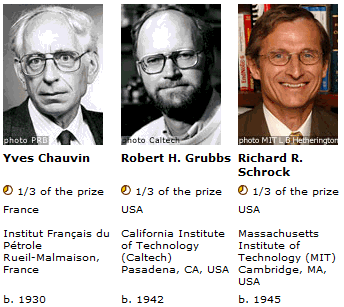 Catalytic
Revolution in Organic Chemistry Awarded 2005 Nobel Prize for Chemistry.
(October 6, 2005)
Catalytic
Revolution in Organic Chemistry Awarded 2005 Nobel Prize for Chemistry.
(October 6, 2005)
|
News & Views item - October 2005 |
 Catalytic
Revolution in Organic Chemistry Awarded 2005 Nobel Prize for Chemistry.
(October 6, 2005)
Catalytic
Revolution in Organic Chemistry Awarded 2005 Nobel Prize for Chemistry.
(October 6, 2005)
The Royal Swedish Academy of Sciences has awarded the Nobel Prize in Chemistry for 2005 jointly to Yves Chauvin, Institut Français du Pétrole, Rueil-Malmaison, France, Robert H. Grubbs, California Institute of Technology (Caltech), Pasadena, CA, USA and Richard R. Schrock, Massachusetts Institute of Technology, Cambridge, MA, USA, "For the development of the metathesis method in organic synthesis". The literal meaning of metathesis being "changing places ".
Metathesis has become one of organic chemistry's most important reactions. The catalytic reactions based on metathesis has allowed the production of many new molecules - pharmaceuticals and herbicides for example.
In metathesis reactions, carbon double bonds are broken and remade between carbon atoms in ways that cause atom groups to change places. However, special catalyst molecules are required to allow the reaction to take place.
In 1971 Yves Chauvin was able to explain in detail how metatheses reactions function and what types of metal compound act as catalysts in the reactions. The next requirement was to develop the actual catalysts.
In 1990 Richard Schrock was the first to produce an efficient metal-compound catalyst for metathesis. However, the family of catalysts based on the Schrock molybdenum and tungsten complexes were unstable and tended to react with other molecular groups attached to the double bonds, which chemists often needed to put there to create their target molecule. Then in 1992 Robert Grubbs developed ruthenium based compounds that interfered less, and were more stable in air. Steven Ley, an organic chemist at the University of Cambridge told Nature, "That is really what rocketed the reaction into common use. It has revolutionized organic synthesis. I don't think there is a single organic chemist who hasn't used metathesis... and if they haven't, they should have. It's a real chemists' award, and these are absolutely the obvious people to give it to."
A more detailed assessment of their work can be found at http://nobelprize.org/chemistry/laureates/2005/chemadv05.pdf